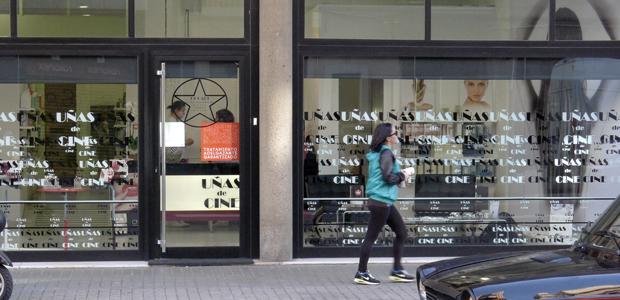In Spain, hair salons and nail salons finding success in a struggling economy
The Cinema Nails salon is almost always fully booked. Opportunities are scarce during this economic crisis; manicurists say ugly hands could make the difference in landing a job. (Photo by Gerry Hadden.)
The stock and bond markets are once more punishing the debt-ridden countries — just days after the latest, greatest, most serious yet, summit to save the euro.
The interest rates Italy and Spain pay on bonds has reached dangerous new highs, once more stoking fears for the common currency.
Spain is about to swear in a new government promising swift labor reform to reduce the country’s 22 percent unemployment. Signs of positive economic news are hard to find.
Hotel owners say bookings are down. Construction companies are idle. But at least one sector is actually growing: health and beauty. On a Barcelona street a tandem of beauty-related businesses thrive.
One of these shops is the Marco Aldany hair salon.
Inside, a bank of chairs is occupied, mostly by middle-aged women getting their hair washed, cut and dyed. More women wait on seats by a window. The manager here, Patricia Marquez, darts from station to station, keeping her stylists, and her clients happy.
“The truth is we can’t complain,” she said. “We’re lucky. It’s a good salon, and our clients are faithful. And more keep coming.”
This is a place that thrives in Spain precisely because times are otherwise tough. Marquez said because people feel out of control and insecure, inexpensive ego-boosts go a long way.
“A person needs to feel handsome, to feel comfortable with themselves. If they don’t look good it doesn’t matter what they do. You have to feel comfortable in your own skin,” Marquez said.
And Marquez said clients are seeking such comfort in her chairs more often, as the economy lurches onward. According to a leading Spanish consulting company, the country’s beauty industry is on track to grow 3 percent this year. The overall economy, by contrast, is flat.
One client here today is Francesca, an auburn-haired retiree. She’s on a fixed income, but said she’d never give up her weekly coif.
“Because of our culture and upbringing,” she said, “we older woman feel better with our hair done up rather than letting it get all messy. It’s a question of feeling good about yourself. If it means spending 50 bucks of your pension per month, well, we can allow ourselves that.”
Fifty bucks is a cheap price for the full treatment, by the way. Economists and sociologists say that makes treating yourself to a new hairstyle, make-over, or manicure nearly crisis-proof.
“Haven’t you heard about the recent survey in Spain?” a client named Mariona asked at a different salon. “It found that if a Spanish woman were forced to choose between a meal or a make-over, she’d go hungry.”
It’s even more true, given Spain’s grim economic backdrop. The government is slashing spending on everything from healthcare to education.
If you don’t believe that hair salons can tell you about the economy, how about lipstick? Enter the Lipstick index, a term coined in 2001 by Leonard Lauder, who works for make-up giant, Estee Lauder. Lauder observed that in times of crisis his company sold more lipstick.
The index is hardly scientific but at the cash register at the Cinema Nails salon, Analda Santano said it’s accurate. But its not just about gloom.
She said people here realize one day the crisis has to end, and the well-groomed will be well-positioned when opportunity knocks.
“If your hands are a mess,” she said, “people will look at you badly. A woman should have her nails painted. If you’re a man your nails need to be smooth and without any flaking skin on the fingers.”
Our coverage reaches millions each week, but only a small fraction of listeners contribute to sustain our program. We still need 224 more people to donate $100 or $10/monthly to unlock our $67,000 match. Will you help us get there today?
